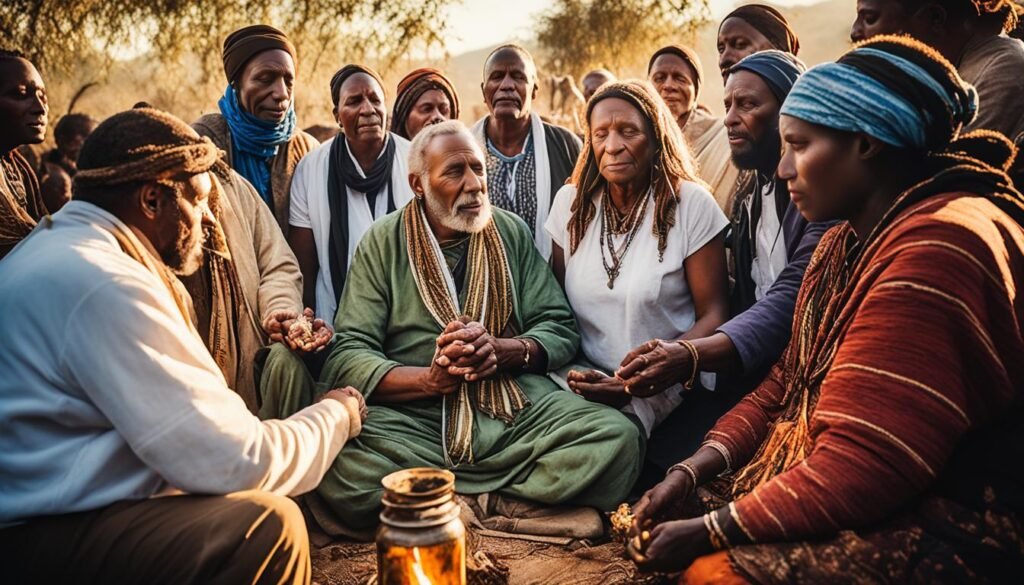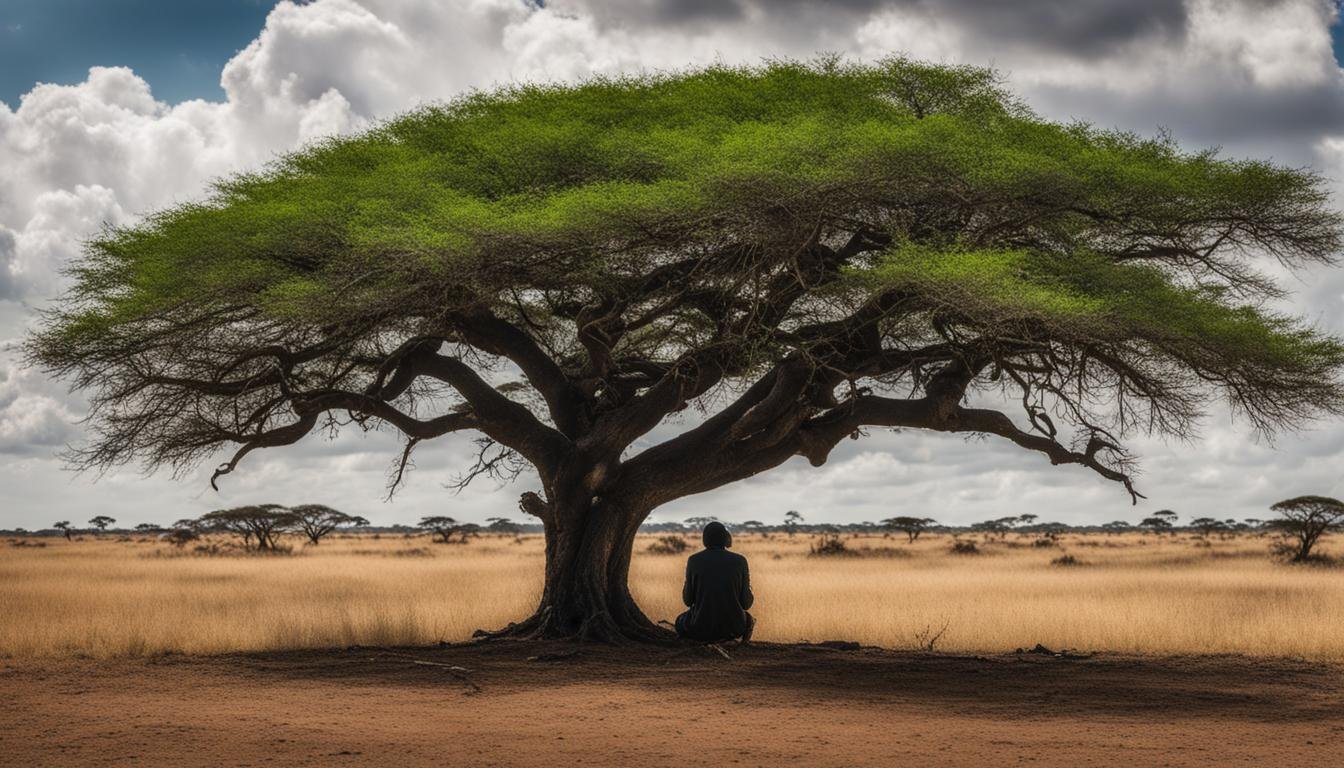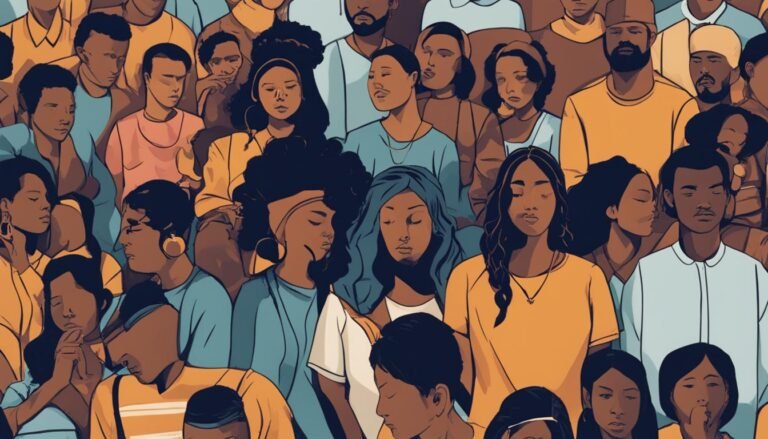How is Mental Illness Treated in Africa?
Access to mental health care in Africa is a significant challenge, with limited resources, stigma, and high treatment costs hindering prevention and care services. Many African governments allocate minimal funding to mental health, well below the recommended amount for low-income countries. This underinvestment is due to competing health and development priorities, as well as a lack of data on the true burden of mental health disorders in the region.
Additionally, limited mental health education and prevailing stigma contribute to the barriers in seeking and receiving mental health care in Africa. However, organizations like StrongMinds Uganda are working towards overcoming these challenges through innovative and cost-effective solutions.
Key Takeaways:
- Poor access to mental health care in Africa is primarily due to low government investment and competing health priorities.
- Mental health education and stigma further inhibit individuals from seeking treatment.
- StrongMinds Uganda is an organization that provides affordable group talk therapy and has seen promising results in treating depression.
- Improving access to mental health care and raising awareness about treatment options are crucial in addressing mental illness in Africa.
- Mental health in Africa requires more investment, policy support, and collaborative efforts to prioritize and alleviate the burden of mental health disorders.
Challenges in Accessing Mental Health Care in Africa
Mental healthcare in sub-Saharan Africa presents several challenges, contributing to inefficiency, inadequacy, and inequity in treatment. These challenges create barriers to accessing the mental health support desperately needed by many individuals in the region.
One significant challenge is the high cost of mental health interventions in Africa. The expenses associated with treatment leave many young people with limited options, forcing them to either live with untreated mental disorders or resort to traditional healing practices. Without affordable and accessible options, individuals may face significant difficulties in managing their mental health.
Furthermore, limited mental health education and prevailing stigma hinder individuals from seeking the support they need. The lack of awareness and knowledge about mental health exacerbates the already existing barriers, making it harder for individuals to recognize their symptoms or understand the available treatment options.
Stigmatization, name-calling, and ridicule further contribute to the challenges of accessing mental health support. The fear of negative treatment and discrimination when disclosing one’s mental health condition creates a hostile environment that discourages individuals from seeking help. This social stigma perpetuates the cycle of inadequate mental health support in the region.
Moreover, the lack of comprehensive data on mental health in health management systems also contributes to the underprioritization of mental health interventions in Africa. Without accurate and up-to-date information, policymakers face challenges in allocating resources and formulating effective strategies to address the mental health needs of the population.
In order to overcome these challenges, it is essential to address the high treatment costs, increase mental health education, combat stigma, and improve data collection on mental health. By tackling these barriers, mental health interventions can become more accessible and supportive for individuals in Africa.
“Improving access to mental health support in Africa requires addressing the high treatment costs, combating stigma, and increasing mental health education to ensure that individuals receive the care they need.”
| Challenges in Accessing Mental Health Care in Africa | Solutions |
|---|---|
| High treatment costs | Implementing affordable mental health interventions |
| Limited mental health education | Investing in mental health education programs |
| Stigma and discrimination | Challenging stigma through awareness campaigns |
| Lack of comprehensive data | Improving data collection on mental health |
Overcoming Challenges in Mental Health Care in Africa
StrongMinds, an organization dedicated to improving access to mental health services in Africa, has implemented group interpersonal psychotherapy as a first-line intervention for depression. This cost-effective solution has shown promising results, with over 80% of women who received therapy reporting no signs of depression post-treatment.
StrongMinds recognizes the importance of education and awareness in addressing mental health issues in Africa. They spread mental health messages through various media channels to reach a wider audience and reduce stigma associated with mental illness.
Advocacy plays a key role in StrongMinds’ efforts. They advocate for the inclusion of people treated for depression in health management systems, the recognition of group talk therapy as a first-line treatment, and collaborate with the Ministry of Health to implement these changes.
Moreover, StrongMinds contributes to research on mental health in Africa to build a comprehensive knowledge base. By conducting studies and gathering data, they aim to improve understanding of mental health conditions and enhance the effectiveness of interventions.
“We believe that by addressing the mental health needs of individuals in Africa, we can make a significant impact on their overall well-being and the development of their communities.” – StrongMinds
In addition to formal mental health services, traditional healing practices for mental illness are prevalent in Africa. Some individuals seek help from traditional healers or religious leaders for treatment. While these practices offer alternative options, they may not always provide evidence-based care or address the full spectrum of mental health conditions.

The Importance of Investing in Mental Health in Africa
Investing in mental health is a crucial step towards improving the lives of individuals in Africa and preventing the long-term negative impacts of untreated mental health conditions. Unfortunately, mental health is often overlooked and underprioritized in global health budgets, leading to limited access to essential care and resources.
Undiagnosed and untreated mental health conditions can have far-reaching consequences, affecting not only the affected individuals but also future generations. Ignoring mental health can lead to increased healthcare costs, reduced productivity, and hindered economic development. Therefore, it is imperative to prioritize mental health services in Africa to address this significant public health challenge.
To improve access to care and allocate adequate resources, a cross-sectoral approach is necessary. Governments, international organizations, NGOs, and the private sector should collaborate to develop comprehensive mental health programs and support systems. By integrating mental health services into the existing healthcare infrastructure, individuals in Africa can have easier access to the help they need.
“Effective mental health interventions can save lives and create a positive ripple effect in society.”
A notable example of an organization making a difference in mental health services in Africa is StrongMinds. With just over $100, the organization can provide an entire course of free treatment to a woman or adolescent in need of mental health services. By delivering cost-effective interventions, StrongMinds is breaking barriers and reaching vulnerable populations who would otherwise have limited or no access to mental health care.
It is also crucial to accurately record the number of people treated for mental illnesses in health management systems. This data is vital for policymakers and budget allocations, enabling them to understand the needs and allocate resources accordingly. By investing in mental health, governments and organizations can make informed decisions and create sustainable strategies to address mental health challenges in Africa.
The Impact of Investing in Mental Health
“Improved mental health services lead to healthier individuals, stronger communities, and sustainable development.”
Investing in mental health in Africa yields several long-term benefits. By providing adequate resources, education, and support, the following positive impacts can be achieved:
- Reduced stigma and increased awareness surrounding mental health issues
- Improved overall well-being and quality of life for individuals and communities
- Enhanced productivity and economic growth through a mentally healthy workforce
- Prevention of negative outcomes such as suicide, substance abuse, and self-harm
- Strengthened health systems and increased resilience to future challenges
Investing in mental health is an investment in the future of Africa. By prioritizing mental health services, governments and organizations can pave the way for a healthier, more prosperous continent.
Mental Health in Africa: The Current Situation and Challenges
Mental health issues in Africa often receive less attention and funding compared to other health priorities. Many African countries lack comprehensive mental health policies, programs, and action plans, leading to significant challenges in addressing mental health needs. The combination of inadequate resources, low incomes, high prevalence of communicable diseases, malnutrition, and conflicts contributes to the burden of mental illness in Africa.
Some of the key mental health challenges faced in Africa are:
- Psychosis: A severe mental disorder characterized by a loss of contact with reality, impaired thinking and emotions, and abnormal behavior.
- Epilepsy: A neurological disorder that affects the brain and causes recurrent seizures.
- Poor psychosocial development in children: The lack of proper mental, emotional, and social growth in children, leading to difficulties in relationships and overall well-being.
- Brain syndromes in the elderly: Age-related cognitive decline and disorders such as dementia and Alzheimer’s disease.
- Substance abuse: The harmful or hazardous use of psychoactive substances like alcohol, drugs, and tobacco.
- Impact of HIV/AIDS: The psychological and emotional impact of living with HIV/AIDS, including depression, anxiety, and stigma.
The lack of attention, resources, and support for mental health in Africa perpetuates a cycle of inadequate care and limited treatment options for individuals struggling with mental illness. It is crucial to address these challenges and prioritize mental health care to improve the overall well-being of African communities.

| Mental Health Challenges in Africa | Impact |
|---|---|
| Psychosis | Severe disruption of daily functioning and impaired quality of life |
| Epilepsy | Restricted opportunities for education, employment, and social integration |
| Poor psychosocial development in children | Long-term mental and emotional difficulties affecting future prospects |
| Brain syndromes in the elderly | Increased dependency on caregivers and reduced overall quality of life |
| Substance abuse | Health consequences, social isolation, and financial burden |
| Impact of HIV/AIDS | Psychological distress, stigma, and reduced adherence to treatment |
Progress in Mental Health Care in Africa
Efforts are underway to improve mental health care in Africa. The World Psychiatric Association (WPA) and World Health Organization (WHO) collaborate on projects to promote mental health and prevent mental disorders in sub-Saharan Africa and Central Asia. The goals include strengthening mental health policies, integrating mental health in primary care, and reducing disability associated with mental disorders. There is an increasing focus on changing public perceptions and attitudes towards mental illness, as well as maximizing available resources and providing equitable access to mental health services. It is also important to address the knowledge gap and increase mental health literacy among the general population.
| Initiative | Objectives | Impact |
|---|---|---|
| Integration of mental health in primary care | – Increase access to mental health services – Improve early detection and intervention |
– Enhanced detection and timely treatment – Reduced burden on specialized services |
| Strengthening mental health policies | – Develop comprehensive mental health frameworks – Promote human rights-based approaches |
– Improved governance and accountability – Increased investment in mental health |
| Reducing disability associated with mental disorders | – Enhance community-based rehabilitation programs – Promote social inclusion and participation |
– Improved functional outcomes for individuals with mental illness – Reduced stigma and discrimination |
Efforts are also being made to bridge the gap between traditional healing practices and modern mental health care. Integrating culturally appropriate counseling and therapies can improve treatment outcomes and promote a holistic approach to mental health. Collaboration between international organizations, governments, and local communities is essential to ensure sustainable progress in mental health care across Africa.
Conclusion
Mental health care in Africa faces significant challenges, including poor access, stigma, and limited resources. However, organizations like StrongMinds are making progress in improving access to care and raising awareness about mental health. Through cost-effective interventions such as group talk therapy, they have successfully treated a large number of depressed women and adolescents in Uganda and Zambia.
Collaborative efforts between international organizations and local governments are crucial in prioritizing mental health in Africa and implementing more effective interventions. By working together, these stakeholders can address the barriers to access, reduce stigma, and allocate the necessary resources to strengthen mental health care systems.
Education, advocacy, and research also play a vital role in building a comprehensive mental health system in Africa. By increasing mental health literacy among the general population, spreading awareness about treatment options such as psychotherapy, and conducting further research, we can better understand the specific mental health needs of individuals across the continent and provide the necessary support.
FAQ
How is mental illness treated in Africa?
Mental illness in Africa is treated through various methods, including therapy options, psychiatric care, and traditional healing practices. Access to mental health care is limited in many African countries, but organizations like StrongMinds are working to improve access and provide cost-effective interventions.
What are the challenges in accessing mental health care in Africa?
The challenges in accessing mental health care in Africa include poor access to services, stigma, limited resources, and high treatment costs. Limited mental health education and the lack of data on mental health also contribute to the barriers in accessing care.
How are challenges in mental health care being overcome in Africa?
Organizations like StrongMinds are overcoming challenges in mental health care in Africa by implementing cost-effective solutions such as group talk therapy. They also focus on education and awareness, collaborate with the Ministry of Health, and contribute to research on mental health in Africa. Traditional healing practices for mental illness are also prevalent in the region.
Why is investing in mental health important for Africa?
Investing in mental health is important for Africa because it improves people’s lives, prevents negative outcomes, and has long-term benefits. Undiagnosed and untreated mental health conditions can have lasting impacts on individuals and future generations. However, mental health is often underprioritized in global health budgets.
What is the current situation and challenges of mental health in Africa?
Mental health in Africa faces challenges such as poor access to care, stigma, limited resources, and the high burden of other health priorities. There is a lack of mental health policies, programs, and action plans in many African countries. Key mental health challenges include psychosis, epilepsy, poor psychosocial development in children, brain syndromes in the elderly, substance abuse, and the impact of HIV/AIDS.
What progress has been made in mental health care in Africa?
Efforts are being made to improve mental health care in Africa, including projects by the World Psychiatric Association (WPA) and World Health Organization (WHO) to promote mental health and prevent disorders. The focus is on strengthening policies, integrating mental health in primary care, reducing disability, changing public perceptions, and increasing mental health literacy. Organizations like StrongMinds are also working to improve access to care and raise awareness.
What is the conclusion about mental health care in Africa?
Mental health care in Africa faces significant challenges, including poor access, stigma, and limited resources. However, organizations like StrongMinds are making progress in improving access to care and raising awareness about mental health. Collaborative efforts between international organizations and local governments can help prioritize mental health in Africa and lead to more effective interventions. Education, advocacy, and research play a crucial role in addressing the mental health needs of individuals across the continent.






